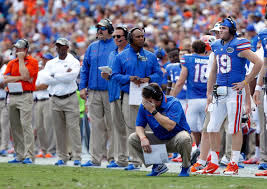
15th seed Middle Tennessee was leading 2nd seed Michigan State by a fitting score of 15-2 at the beginning of their game yesterday. We’re all now recuperating from the shock today of tournament favorite Sparty being bested by…I don’t even know the name of Middle Tenn’s mascot. Quick google search, OK… the Blue Raiders. What kind of a mascot is that?! Although 15-2 was a sizeable lead, did any of you really think that Michigan State was going to stay down? It is amazing looking back that Middle Tennessee did not even relinquish the lead once against a team many thought would win the whole thing.
But late in the 2nd half, Michigan State did pull to within 3 with 2 foul shots awaiting. During the preceding time out, I would imagine that most 15th seeded teams would despair. Coach Kermit Davis: “We looked at each other, and said, ‘Let’s enjoy this. Let’s have fun right here’.” I want you to notice these words. “Enjoy this” “Right here”. Very present moment. Under the microscope of the NCAA tournament a lot of athletes in this particular situation would remain in the past: “How did we let a lead like that get away?” “Should have made that shot!” “Why did I make that turnover?!” Or think forward into the future: “We let this one slip away. All that we’ve been through this season…well, it was a good run” or even “We still have a chance to make history”. Nope. The players and coaches looked at each other and as one said “Let’s have fun right here.” Right now. Will this attitude guarantee a win every time? No. Is this attitude difficult to have? Hell, yeah. But with a mindset of being open to a present moment experience that is sitting in front of you, it does make it more likely to play the game, and I mean “play” in every sense of that word, “relaxed and real confident” as witnessed by Coach Davis. No, you may not “win”, but you’ll sure have fun.





